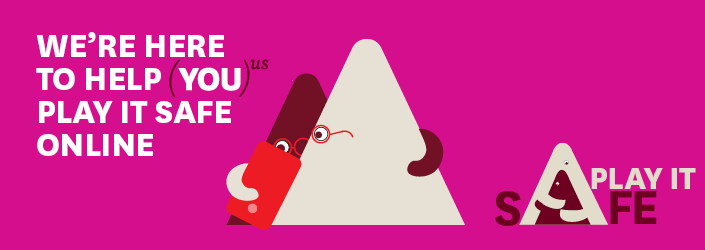
How to stay in con-troll online
What are trolls or trolling online
Trolling is when someone online is deliberately trying to upset or provoke other person/s online. Trolls often post or comment anonymously and try to provoke an emotional response from people. Examples of trolling include posting offensive comments on other peoples’ posts on social media, sending direct messages that intend to bully or cause harm, or even the use of derogatory terms or personal attacks on discord when playing a video game online. Check out the eSafety government website website for more information on online trolling.
Managing trolls
 So we know trolls want to cause trouble and push your buttons. They’re total pests. But you don’t have to let them bring you down, nor do you have to stop participating in your favourite online spaces. We’ve compiled a list of our best moves for dealing with trolls.
So we know trolls want to cause trouble and push your buttons. They’re total pests. But you don’t have to let them bring you down, nor do you have to stop participating in your favourite online spaces. We’ve compiled a list of our best moves for dealing with trolls.
Starve the troll
It’s totally understandable to want to wage a war on trolls with your keyboard, but trolls thrive on others’ anger, frustration and annoyance. Don’t forget, they do this because they want you to react.
This means that the angrier you get, the stronger they become. So, your best bet for ridding the internet of trolls is to starve them of a reaction.
This can be pretty challenging. It helps to remember that trolls don’t actually believe what they’re posting, so you can’t beat them with logic or fact. When you’re being trolled, the best thing to do is to ignore the posts, eventually they’ll probably get bored and go away.
Record it
No matter whether it happens once or repeatedly, take a screenshot so that you have a record of the original message.This covers you if the person tries to edit or delete their comment once they realise it could get them in trouble.
These records can also be handy if things escalate and you need to take the matter further.
Stand up for yourself
You can ignore trolls and still make a stand against them. Most social media sites have report and block functions in place to stop trolls from bugging you and to keep you feeling safe online.
Read up on what else you can do filter out the trolls from your feed in the safety guidelines for each social media platform:
- Instagram safety
- Bullying prevention on TikTok
- Snapchat’s Privacy and Safety Hub
- Managing harassment on Twitch
- Discord’s Safety Centre.
If you’ve exhausted the reporting and blocking options within your social media platform and things are still really bad, you need to make a report to the eSafety Commissioner using this form.
Before you make a complaint, you need to:
- have copies of the cyberbullying material ready to upload (screenshots or photos)
- report the material to the social media service at least 48 hours before filling out the form
- gather as much information as possible about where the material is located
- allow 15–20 minutes to complete the form.
You can expect to hear from the eSafety Commissioner within two business days after filing your report and the person harassing you may face serious consequences.
Out-troll a troll
So we know trolls want to introduce conflict and cause problems in online communities by malicious verbal assaults to individuals and the community itself. Whilst it is irritating and sometimes upsetting to be impacted by trolls, one strategy is to become an even bigger troll yourself.
This infographic provides great tips on how to out-troll the troll and give you some confidence to push back.
Additionally these following two resources can also provide some strategies to take the trolls on:
- The Family and Youth Institute - How to deal with cyber-bullying checklist
- Kuno Creative - A guide to dealing with negativity in social media
Log off
It can be really overwhelming when trolls are constantly pestering you. While you can’t control other people’s trolling behaviour, you can try to limit the amount of time you spend dealing with it.
Logging off social media can be really difficult, but it’s a good idea if you’re feeling upset.
Don't worry, you don’t have to go completely off the grid. You could try:
- turning off push notifications
- logging off from the accounts that are most affected by trolling
- deleting social media apps from your phone
- only logging on at certain times, like when you’re at home.
Tell someone you trust
It can help to talk to someone if trolls are getting you down. Although it can be really tough, opening up about the situation can make you feel a lot better. Choose someone who you trust and who will be able to give you the help you need, such as a friend, family member, counsellor or teacher.
Work out what you want to say beforehand, focusing on how the experience is affecting you and what help you want from them. If they don’t give you the support you’re looking for, try speaking to someone else.
Find more tips on how to talk to someone you trust.
Submit a CARE report - MQ Student Wellbeing staff will contact you to confidentially discuss the situation and work with you to feel more supported. They can help you deal with how you feel after being trolled but they can’t stop the trolling or misconduct themselves. They also offer other services such as online wellbeing support and counselling, and mental health support if you or someone you know has been affected by online trolling. For further assistance you can report incidents of trolling or cyberbullying to eSafety.
Alternatively, if you wish to seek further support outside the services offered by the university, you can contact the services listed below:
- Beyond Blue: 1300 224 636
- Lifeline: 13 11 14
- Kids Helpline: 1800 551 800
- NSW Mental Health Line: 1800 011 511
- 1800 YARN: 13 92 76
- ESafety FirstNations: https://www.esafety.gov.au/first-nations
Other online behaviour
Online bad behaviour takes many shapes and forms and is not exclusive to trolling. Some other issues relating to online behaviour you should be aware of include:
 Catfishing is when someone uses social media to create a fake identity or pretends to be someone you know as a means to trick you into a fake relationship. They may do this because they think it is funny or they want to embarrass you, or as a means to gain something from you such as money, gifts or inappropriate photos. They may also encourage you to share your secrets so they can use that information to blackmail you or humiliate you. They may also ask for your personal information so they can scam you or steal your identity.
Catfishing is when someone uses social media to create a fake identity or pretends to be someone you know as a means to trick you into a fake relationship. They may do this because they think it is funny or they want to embarrass you, or as a means to gain something from you such as money, gifts or inappropriate photos. They may also encourage you to share your secrets so they can use that information to blackmail you or humiliate you. They may also ask for your personal information so they can scam you or steal your identity.

With online dating becoming more common with apps such as Tinder, Bumble and Grindr, it is important to be aware of the risks and how to stay safe. Some people create fake profiles to scam, cyberstalk, or catfish people they connect with. People may also try to illicit private information or inappropriate photos to use to blackmail you. Be careful about who you share your personal details with and when meeting in person, make sure to meet in a public place and tell someone you know where you are going. Feel comfortable to say no and trust your instincts when it comes to interactions online. If you feel uncomfortable, report the user or block them.
 Sharing sensitive content may include personal information or nude/inappropriate photos. It may seem harmless to share sensitive content with someone you trust, but anything you share with someone else can be saved by them to their phone or computer. This gives them power over you as they can share it with other people or use it to blackmail you. The person asking for the sensitive information or photos may be someone scamming you or catfishing you, as well as someone you once shared a relationship with could use/share the images as a form of revenge. Someone could also steal your sensitive images and videos by hacking your account and searching your conversations. It is illegal for someone to threaten to share your information or private photos or videos, so if this happens to you, stop all contact and report them through the eSafety website. The best way to prevent this happening is to not share your sensitive information online with anyone.
Sharing sensitive content may include personal information or nude/inappropriate photos. It may seem harmless to share sensitive content with someone you trust, but anything you share with someone else can be saved by them to their phone or computer. This gives them power over you as they can share it with other people or use it to blackmail you. The person asking for the sensitive information or photos may be someone scamming you or catfishing you, as well as someone you once shared a relationship with could use/share the images as a form of revenge. Someone could also steal your sensitive images and videos by hacking your account and searching your conversations. It is illegal for someone to threaten to share your information or private photos or videos, so if this happens to you, stop all contact and report them through the eSafety website. The best way to prevent this happening is to not share your sensitive information online with anyone.
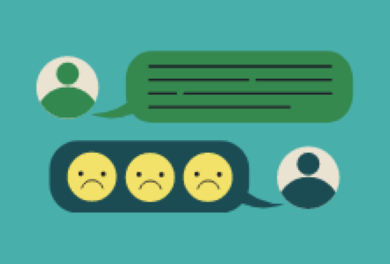 Bullying online or cyberbullying is when someone uses social media to be nasty to another person to upset or hurt them, embarrass them or make them feel bad. Cyberbullying can negatively impact a person’s mental and physical health and can happen through any online means such as posting, commenting, texting, messaging, memes, images, videos or emails. If you or someone you know is experiencing cyberbullying, block the user and report it in the app or site, as they can usually remove or take down the content, or if they don't help, report it to eSafety to investigate and remove it.
Bullying online or cyberbullying is when someone uses social media to be nasty to another person to upset or hurt them, embarrass them or make them feel bad. Cyberbullying can negatively impact a person’s mental and physical health and can happen through any online means such as posting, commenting, texting, messaging, memes, images, videos or emails. If you or someone you know is experiencing cyberbullying, block the user and report it in the app or site, as they can usually remove or take down the content, or if they don't help, report it to eSafety to investigate and remove it.
You may find The Family and Youth Institute - How to deal with cyber-bullying checklist helpful.
Scamming has become more common, especially via phone, text and emails. Scams can often appear legitimate and like a real company is reaching out to you. Scammers will often ask for personal information or bank details under the guise of a real company or government agency, such as Australian Post, NSW Government, the Australian Taxation Office or Commonwealth Bank. Other scammers may contact you pretending to be someone you know. Most scam messages also include a link that may contain a hidden virus or will take you to a fake website that will ask for your personal details or ask you to pay a fee. Scams also usually have a sense of urgency as a means to get you to act quickly rather than consider whether it could be a scam.
Below are some examples of different types of scams you may encounter:
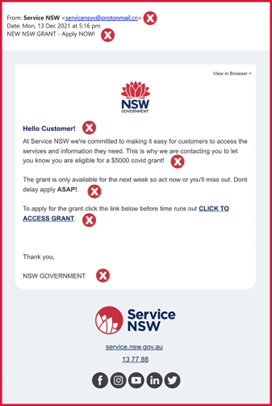 |  |
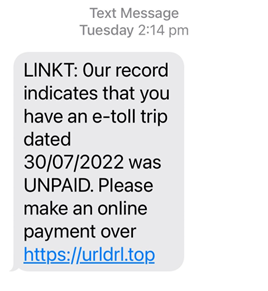 | 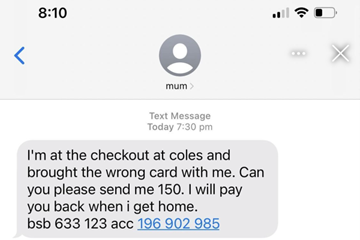 |
Text Scams
Examples of text scams are texts saying you need to pay $1 for Auspost to release your parcel, a text from Linkt asking you to pay an outstanding e-toll trip fee, or a text from your Mum or Dad asking you to transfer them money as they have left the correct debit card at home.
Email Scams
Examples of email scams are emails pretending to be from Netflix asking you to login to update your payment details or an email from Commonwealth Bank asking you to verify your account as there has been suspicious activity detected.
Phone Scams
Examples of phone scams include a call telling you you’ve won a prize or vacation and to pay a small fee to collect your prize or provide your personal details, or a fake debt collector telling you if you don’t pay your outstanding debt, you will face prison time.
What to do if you suspect a scam
- Do not respond at all if you suspect it is a scam
- Block the sender
- Delete the message
- Report the scammer to Scam Watch or Australian Cyber Security Centre
- Report to spam@mq.edu.au if it has been sent to your student email address, or if the recipient is claiming to be from Macquarie University
 It may be hard to keep track of how much time you are spending online as it is easy to get carried away. However, if you are mindful of how often and why you are going online, it can help you gain more balance and have a healthier relationship with technology
It may be hard to keep track of how much time you are spending online as it is easy to get carried away. However, if you are mindful of how often and why you are going online, it can help you gain more balance and have a healthier relationship with technology
Although there are many benefits to the internet, it can become an unhealthy addiction when you spend too much time engaging with it. It should enhance your life, not dominate it. As going online makes your brain release dopamine, the “happy” hormone, it becomes more and more addictive the longer you are on it. Spending too much time online can make study, work and relationships more difficult and cause issues with your physical and mental health. It can also cause issues such as being less present when you focus on your phone more than the people or situation happening in real life around you, or it can cause you to develop anxiety or body issues when you constantly compare yourself to others you see on social media.
Things you can do to achieve more balance in your relationship with technology include:
- Put limits on the time you spend on your phone
- Put your phone on do not disturb or turn off notifications
- Spend some time outside in nature
- Devote time to a hobby such as drawing, art, a sport, reading, or spending time with friends
- Do not start and end your day with checking your phone
- Delete an app
